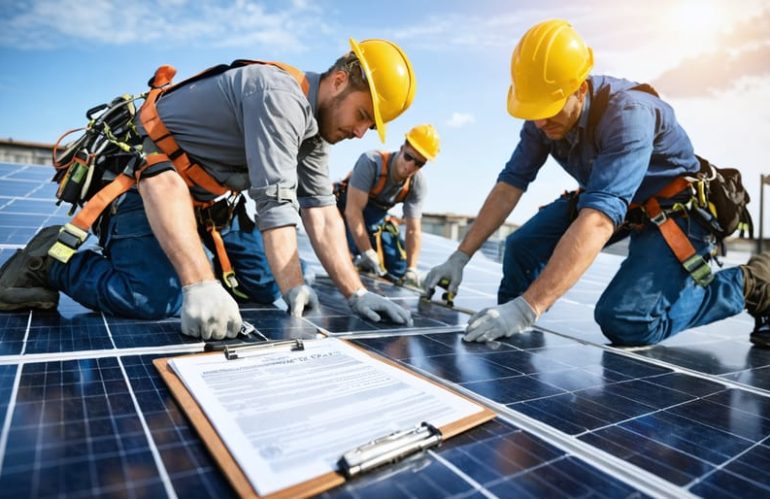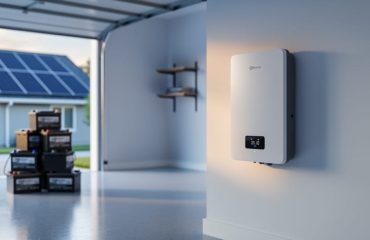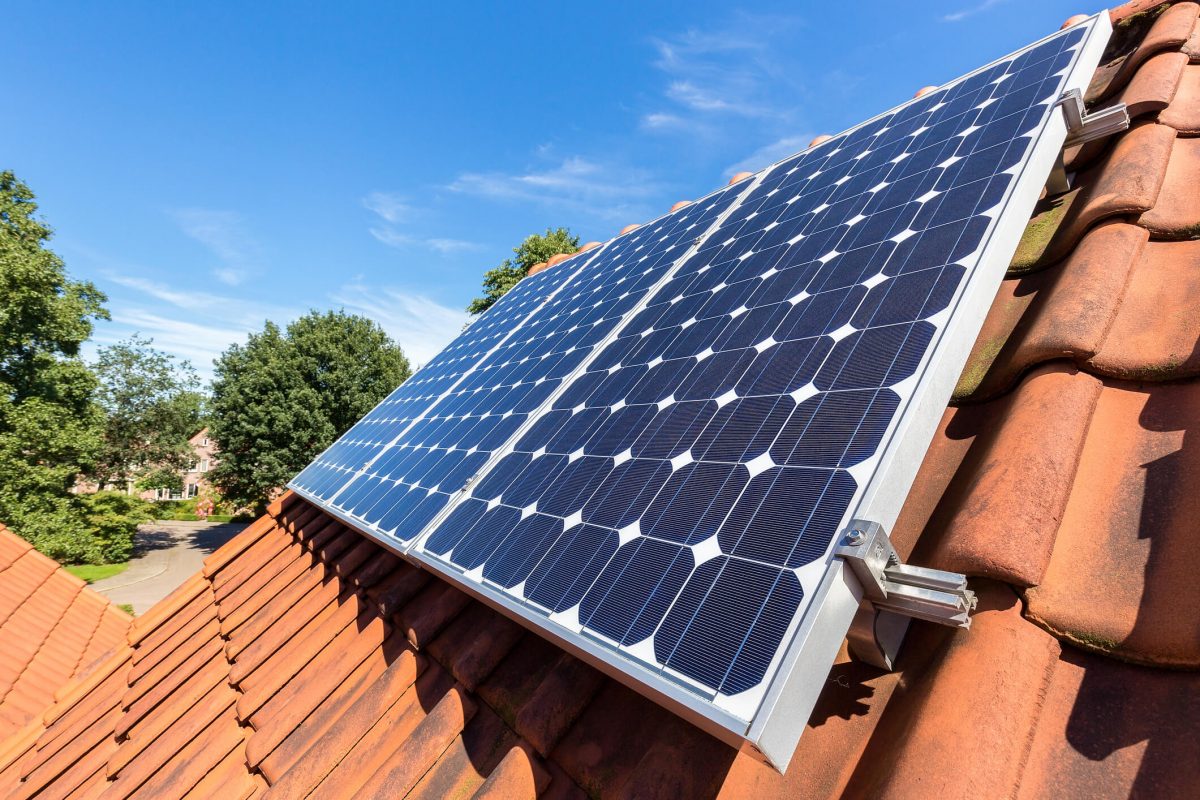Protect your solar investment and ensure safety by verifying proper licensing before hiring any solar installation contractor. A valid solar installation license demonstrates that your installer has completed essential training, understands local building codes, and maintains proper insurance coverage. During the solar installation process, licensed professionals follow strict quality standards, maximize system efficiency, and ensure compliance with utility requirements. Their expertise helps secure necessary permits, qualify for tax incentives, and maintain manufacturer warranties. Whether you’re considering rooftop panels or ground-mounted arrays, working with a licensed installer safeguards your investment and provides peace of mind for decades of reliable clean energy production.
Why Solar Installation Licensing Matters
Safety and Quality Assurance
A solar installation license serves as your guarantee of safety and quality workmanship. Licensed installers must demonstrate thorough knowledge of electrical systems, roofing techniques, and local building codes before they can perform installations. This certification ensures they understand crucial safety protocols, proper equipment handling, and current industry standards.
Licensed contractors carry appropriate insurance coverage, protecting homeowners from liability in case of accidents or damage during installation. They also understand the importance of proper permitting and inspections, ensuring your system meets all local safety requirements and building codes.
Quality assurance extends beyond installation day. Licensed installers typically offer warranties and maintain detailed documentation of their work, providing peace of mind for years to come. They’re also required to stay current with evolving technology and safety standards through continuing education, ensuring your solar system is installed using the latest best practices and safety measures.
Remember, choosing a licensed installer isn’t just about following regulations—it’s about protecting your investment and ensuring your solar system operates safely and efficiently for decades.
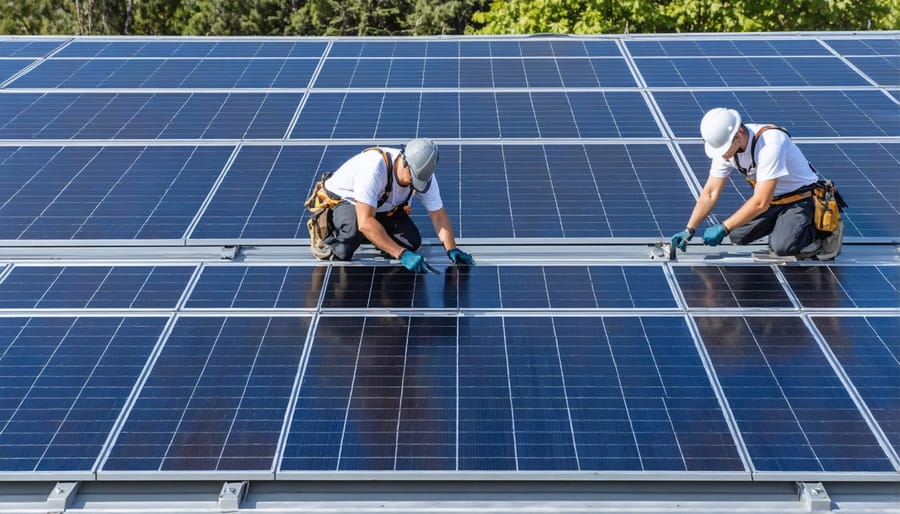
Insurance and Warranty Protection
Working with a licensed solar installer is crucial for maintaining valid insurance coverage and warranty protection. Most homeowner insurance policies require that any major electrical work, including solar installation, be performed by licensed professionals. When unlicensed contractors perform installations, it can void your home insurance coverage and potentially leave you liable for any damages or accidents.
Similarly, solar panel manufacturers typically require professional installation by licensed contractors to maintain their warranty coverage. Working with an unlicensed installer could invalidate these valuable manufacturer warranties, which often extend 20-25 years. This protection is essential for safeguarding your solar investment over its lifetime.
Licensed installers also carry their own insurance and bonding, providing additional protection for homeowners. This includes worker’s compensation insurance and liability coverage, ensuring you’re protected if accidents occur during installation. Always request proof of both licensing and insurance documentation before proceeding with your solar installation project.
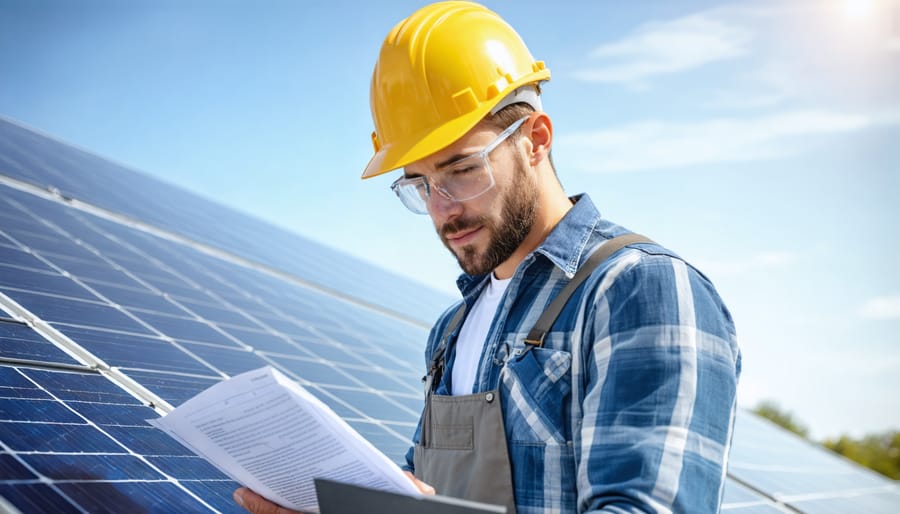
Types of Solar Installation Licenses
Electrical Contractor Licenses
Electrical contractor licenses are a crucial component of solar installation credentials. Most states require solar installers to hold or work under a valid electrical contractor’s license due to the complex electrical systems involved in solar installations. These licenses ensure that professionals have the necessary expertise to safely handle high-voltage electrical components and integrate solar systems with your home’s existing electrical infrastructure.
To obtain an electrical contractor’s license, professionals typically need several years of hands-on experience, formal education in electrical systems, and must pass comprehensive exams covering electrical theory, safety protocols, and local codes. Many states have different classes of electrical licenses, with specific designations for solar and renewable energy systems.
When choosing a solar installer, always verify their electrical licensing credentials through your state’s licensing board. A valid electrical contractor’s license demonstrates that your installer has met rigorous safety and competency standards, giving you peace of mind that your solar installation will be completed safely and effectively. Remember that working with an unlicensed contractor could void warranties and create safety hazards.
Specialized Solar Certifications
Several respected organizations offer specialized solar certifications that demonstrate an installer’s expertise and commitment to quality. The North American Board of Certified Energy Practitioners (NABCEP) certification is widely considered the gold standard in the solar industry. Their PV Installation Professional Certification requires extensive training, documented installation experience, and passing a rigorous exam.
The Solar Energy International (SEI) also provides comprehensive certification programs, focusing on both technical skills and safety protocols. Their credentials are particularly valuable for installers working with specific types of solar systems or in challenging environmental conditions.
The Electronics Technicians Association (ETA) offers the Photovoltaic Installer certification, which covers system design, installation, and maintenance. This certification is particularly helpful for those focusing on residential installations.
For homeowners, choosing an installer with these certifications provides peace of mind and ensures your solar project will be completed safely and efficiently. When evaluating potential installers, look for these credentials alongside state-required licenses, as they demonstrate a commitment to professional excellence and ongoing education in the field.
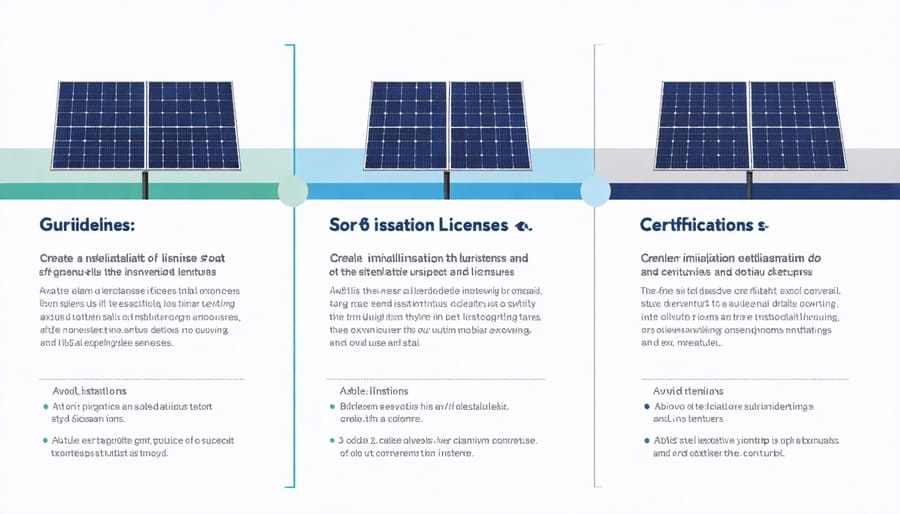
How to Verify Your Installer’s Credentials
Online License Verification Tools
Several reliable online tools make it easy to verify your solar installer’s license status. Start with your state’s contractor licensing board website, which typically offers a free search function where you can enter the contractor’s license number or business name. The North American Board of Certified Energy Practitioners (NABCEP) maintains a database of certified solar professionals that you can access through their website.
Many states also provide consumer protection websites where you can check for complaints or disciplinary actions against contractors. For added peace of mind, cross-reference your findings with the Better Business Bureau’s online directory, which includes detailed business profiles and customer reviews.
Remember to save screenshots or print copies of license verification results for your records. These tools are regularly updated, making them the most reliable way to ensure your chosen installer maintains current, valid credentials.
Red Flags to Watch For
When evaluating solar installers, be alert to several warning signs that could indicate licensing issues. Avoid contractors who pressure you for an immediate decision or demand full payment upfront. Be wary of those who can’t provide their license number readily or hesitate to share references from recent installations.
Watch out for unusually low bids, as they might indicate subpar materials or inexperienced workers. If a contractor suggests skipping permits or inspections, this is a major red flag. Similarly, be cautious of installers who lack physical business addresses or proper insurance documentation.
Check that the company name on their license matches their business materials exactly. Some fraudulent contractors use similar-sounding names to deceive homeowners. Also, be suspicious if they’re unwilling to provide detailed written contracts or if they insist on cash-only payments.
Trust your instincts – if something feels off about a contractor’s credentials or behavior, it’s worth taking extra time to verify their legitimacy.
Questions to Ask Your Solar Installer
Before signing any contracts, it’s crucial to ask your potential solar installer the right questions about their licensing and certifications. Here’s a comprehensive list to help you make an informed decision:
1. Are you licensed to install solar systems in this state? Ask for their license number and verify it through your state’s contractor licensing board.
2. Do you have specific solar certification, such as the North American Board of Certified Energy Practitioners (NABCEP) certification?
3. How long has your company been installing solar systems, and how many installations have you completed in this area?
4. Will you be using subcontractors for any part of the installation? If so, are they also properly licensed and certified?
5. Can you provide proof of liability insurance and workers’ compensation coverage?
6. What warranties do you offer, and are they backed by insurance in case your company goes out of business?
7. Do you handle all necessary permits and inspections with local authorities?
8. Can you provide references from recent local installations?
9. Who will be my main point of contact throughout the installation process?
10. What ongoing support do you provide after installation?
Remember to get all answers in writing and include them in your contract. While discussing these points, don’t forget to ask about financing your solar installation, as reputable installers often have established relationships with trusted financial partners.
Take notes during these conversations and don’t hesitate to ask for clarification. A professional installer will be happy to address all your concerns and provide the documentation you request.
State-Specific Requirements
Solar installation licensing requirements vary significantly across different states, reflecting local solar power regulations and industry standards. Some states, like California and Florida, have specific solar contractor licenses that installers must obtain. Others may require either an electrical license or a general contractor license with solar certification.
For example, California mandates a C-46 Solar Contractor License, which involves passing both written and practical exams. In contrast, Massachusetts requires installers to hold an electrical license and complete additional solar-specific training. Some states have reciprocity agreements, allowing licensed contractors from one state to work in another without obtaining additional credentials.
Many states also require contractors to maintain insurance coverage, complete continuing education courses, and register their business with local authorities. Some jurisdictions may require additional certifications from organizations like the North American Board of Certified Energy Practitioners (NABCEP).
Before hiring a solar installer, homeowners should check their state’s specific requirements through their local contractor licensing board or consumer protection office. This ensures they work with properly qualified professionals who understand local building codes, safety standards, and installation best practices.
Remember that requirements can also vary at the county or city level, so it’s essential to verify local regulations as well.
Taking the step toward solar energy is a smart investment in your home’s future, and ensuring proper licensing is crucial for a successful installation. By choosing a licensed solar installer, you’re protecting your investment and ensuring compliance with local regulations. Remember to verify credentials, check references, and ask about specific experience with similar installations. Don’t hesitate to request multiple quotes and documentation of licenses and insurance. When you’re ready to move forward, contact your local building department to understand specific requirements and schedule necessary inspections. With the right licensed professional by your side, you’ll be well on your way to enjoying clean, renewable energy while potentially saving thousands on your electricity bills over the years.

